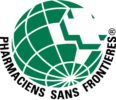
Selling medicines on the street, Cambodia, 2012. © PSF Switzerland
Risks related to the shipment of unused medicines
The quality of unused medicines cannot be guaranteed
The conditions of transport, storage and distribution of unused medicines do not guarantee that the initial quality of the products sent is maintained.
Unused medicines have too short a shelf life
Many unused medicines are unusable because they have expired, are close to the expiry date or simply do not have an expiry date. Moreover, expiry dates are only valid if the storage conditions are appropriate (adequate temperature, humidity and light). Treating patients with expired drugs leads to a reduction in therapeutic response and can have serious consequences if the degradation of the drug is significant.
According to the WHO, the consumption of poor quality antibiotics, including expired and counterfeit drugs, is one of the main problems in the development of antibacterial resistance in developing countries.
According to a study by PSF International, of the hundreds of tons of medicines sent to the disaster areas following the 2004 Indian Ocean tsunami, 25% were expired. 600 tons of expired medicines had to be disposed of directly, at a cost of 2,400,000 euros.
tons of expired medicines
euros spent to dispose of outdated unused medicines
Unused medicines compete with local economy
Unused medicines can unbalance the local economy, through unfair competition, because they compete with medicines that are manufactured locally or imported from neighbouring countries. Moreover, since they do not follow the usual distribution circuit, they can fuel drug trafficking and are sold on the black market by people without adequate training, with all the risks that this entails.
Unused medicines are unsuitable for local situations and conditions
Countries in the South or in emergency situations do not have the same needs as European countries. Medicines commonly used in Switzerland may therefore be useless as they do not meet the epidemiological profiles of the field. Most of them are also not designed for the climatic conditions of the South, such as suppositories which are not heat resistant. Finally, in emergency situations, the interventions of medical teams with limited staff require a regular supply of medicines specific to local pathologies (injectable antibiotics, infusions, etc.) and packaged in a manner adapted to the situation (hospital format).
Unused medicines are unknown to local staff
Most boxes of unused medicines sent home do not carry the International Non-proprietary Name (INN), but only the brand name, which is unknown in many receiving countries. Leaflets are also often written in languages that local health staff do not understand. This leads to potential misuse of these medicines.
According to a study by Pharmaciens Sans Frontières International, of the hundreds of tons of medicines sent to disaster areas after the 2004 tsunami, 70% were unknown in the receiving countries.
Unused medicines are expensive for recipient countries
The effort required by local staff to sort, store and coordinate unused medicines entails financial, human and space costs that are often not available in emergency situations.
Faced with the quantities of medicines sent, especially following high-profile disasters, local storage capacity is insufficient. This means that space in health centres has to be sacrificed or new space rented in order to be able to sort out the UNMs. The costs of taxes, storage and transport often exceed the value of the medicines themselves.
Inappropriate or outdated medicines must eventually be disposed of by the recipient countries, which results in enormous costs. Inappropriate disposal also creates significant risks, both for public health and the environment.
During the major floods in Venezuela in 2000, 70% of the medicines had to be destroyed. US$16,000 was spent on staff to sort out the unused medicines, while a telephone helpline for psychological support for victims was closed due to lack of funds (see: Thomas M., Drug Donations: Corporate Charity or Taxpayer Subsidy? in War On Want, 2001)
Thus, one of the central elements of PSF Switzerland’s intervention, in order to guarantee optimal quality of the medicines provided, is to set up a network of reliable local suppliers with its local partners.
%
